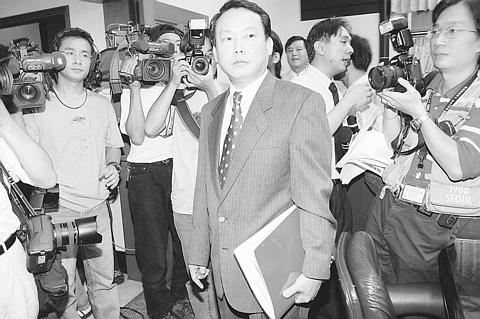President Chen Shui-bian's (陳水扁) announcement of a re-launch of investigations into the mysterious 1993 murder of navy Captain Yin Ching-feng (尹清楓) has proceeded with great momentum and fanfare over the past week, but whether the renewed probe will yield any concrete results still remains to be seen.
This week's renewed efforts were immediately met by infighting between the newly established investigation task force and the military. The two spent a majority of the week arguing over copies of cassette tapes which contain interviews with a key witness already convicted in the case.
While national dailies fueled the building debate over the "new clues" supposedly contained on the tapes, a careful review of the investigation over the past six years shows that what is now being touted as "new clues" are actually old ones.

PHOTO: CHEN CHENG-CHANG, TAIPEI TIMES
Ex-Criminal Investigation Bureau director Yang Tze-chin (
Kuo made the confession on July 25 to People First Party lawmaker Lee Ching-hua (
"The pity is that a lot of clues are unavailable because several key witnesses left the country after the murder and cannot be contacted," Yang told the Taipei Times.
While he did not name them, Yang was referring to people like Andrew Wang (汪傳浦) and Tu Cheng Chun-chu (涂鄭春菊). Both have fled the country and now live abroad.
Yang also pointed to the importance of searching bank accounts of individuals suspected of involvement.
"The Yin murder is not an unsolvable case. The murder was a result of a weapons purchase scandal. We are confident we can crack this case as long as we can have access to data about cash flows in the bank accounts of all the suspects," he said.
"This is the biggest difficulty in the investigation. It is very difficult for Taiwan's legal authorities to investigate bank accounts of all the key witnesses who are abroad. As a matter of fact, evidence in this area has never been sought in the past," he added.
A military official, involved in the investigation of the murder for several years, said a crucial problem with the case was that investigators originally presumed Yin had drowned and not been murdered.
"The first week after a murder is the most important period for evidence gathering. But military investigators responsible for finding out the cause of Captain Yin's death missed that chance," said Colonel Yang Wen-hsien (楊文賢), deputy director of the discipline monitoring office of the Ministry of National Defense.
Yang, a member of a military investigation team formed specially for the Yin case, is the son of the country's former top coroner, Yang Jih-sung (

The US government has signed defense cooperation agreements with Japan and the Philippines to boost the deterrence capabilities of countries in the first island chain, a report by the National Security Bureau (NSB) showed. The main countries on the first island chain include the two nations and Taiwan. The bureau is to present the report at a meeting of the legislature’s Foreign Affairs and National Defense Committee tomorrow. The US military has deployed Typhon missile systems to Japan’s Yamaguchi Prefecture and Zambales province in the Philippines during their joint military exercises. It has also installed NMESIS anti-ship systems in Japan’s Okinawa

‘WIN-WIN’: The Philippines, and central and eastern European countries are important potential drone cooperation partners, Minister of Foreign Affairs Lin Chia-lung said Minister of Foreign Affairs Lin Chia-lung (林佳龍) in an interview published yesterday confirmed that there are joint ventures between Taiwan and Poland in the drone industry. Lin made the remark in an exclusive interview with the Chinese-language Liberty Times (the Taipei Times’ sister paper). The government-backed Taiwan Excellence Drone International Business Opportunities Alliance and the Polish Chamber of Unmanned Systems on Wednesday last week signed a memorandum of understanding in Poland to develop a “non-China” supply chain for drones and work together on key technologies. Asked if Taiwan prioritized Poland among central and eastern European countries in drone collaboration, Lin

NO CONFIDENCE MOTION? The premier said that being toppled by the legislature for defending the Constitution would be a democratic badge of honor for him Premier Cho Jung-tai (卓榮泰) yesterday announced that the Cabinet would not countersign the amendments to the local revenue-sharing law passed by the Legislative Yuan last month. Cho said the decision not to countersign the amendments to the Act Governing the Allocation of Government Revenues and Expenditures (財政收支劃分法) was made in accordance with the Constitution. “The decision aims to safeguard our Constitution,” he said. The Constitution stipulates the president shall, in accordance with law, promulgate laws and issue mandates with the countersignature of the head of the Executive Yuan, or with the countersignatures of both the head of the Executive Yuan and ministers or

CABINET APPROVAL: People seeking assisted reproduction must be assessed to determine whether they would be adequate parents, the planned changes say Proposed amendments to the Assisted Reproduction Act (人工生殖法) advanced yesterday by the Executive Yuan would grant married lesbian couples and single women access to legal assisted reproductive services. The proposed revisions are “based on the fundamental principle of respecting women’s reproductive autonomy,” Cabinet spokesperson Michelle Lee (李慧芝) quoted Vice Premier Cheng Li-chiun (鄭麗君), who presided over a Cabinet meeting earlier yesterday, as saying at the briefing. The draft amendment would be submitted to the legislature for review. The Ministry of Health and Welfare, which proposed the amendments, said that experts on children’s rights, gender equality, law and medicine attended cross-disciplinary meetings, adding that